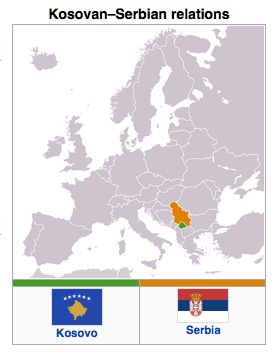Kosovo And Serbia Turn Attention To Energy
By SETimes
By Bojana Milovanovic and Linda Karadaku
Belgrade and Pristina plan to concentrate on resolving energy and telecommunications issues in the next round of their EU-mediated talks. The Energy Community, which regulates energy issues across Europe under the EU acquis, has declared Belgrade in violation of Energy Community rules because it failed to compensate Pristina for using transmission lines in northern Kosovo to move electricity to Serbia and adjacent countries.

“It has been made clear to Serbia that it has to correct its policies toward Kosovo and this automatically means accepting the energy treaty between the two states,” Edita Tahiri, Kosovo’s deputy prime minister and head of the country’s team in the technical talks, told SETimes. “The draft agreement has been worked out between the two sides [Kosovo and Serbia], but Serbia has not been ready to accept it.”
In addition to compensating Kosovo, Tahiri said the agreement specifies that energy assets in Kosovo will be controlled by Pristina.
The secretariat of the Energy Community has been attempting to resolve the issue for two years.
Borislav Stefanovic, former chief of Serbia’s negotiating team, told SETimes that the talks on energy have not been productive because Serbia has been making concrete proposals, all of which Pristina has turned down.
Stefanovic said Serbia’s goal is to preserve the capacity of the Electric Power Company of Serbia (EPS) in northern Kosovo, keeping it in the hands of the EPS or a subsidiary that would be founded in Pristina. The priority also is to enable regular electricity supplies to Serbs in the enclaves south of the Ibar River, Stefanovic said.
“The negotiations were also supposed to have reached an agreement on settling the debts of the Kosovo Power Company and the EPS. That is what we have been trying and we’ve been very flexible about it all, with the aim of maintaining the most important facilities in the north of Kosovo — Gazivode and Valac,” Stefanovic said.
Rasim Ljajic, Serbia’s minister of foreign and domestic trade and telecommunications, told SETimes that officials also plan to discuss Kosovo’s dialing code. “Kosovo institutions have asked for an international dialing code and wanted it to be the available number 383,” Ljajic said. “In the previous talks, Serbia had offered a compromise solution, 3815 [Serbia’s dialing code with the added 5], but that was rejected.”
He said the talks also would focus on the fate of telecommunications property and the work of Serbian operators in Kosovo.
“We are waiting for the outcome of talks between the two prime ministers since they are to determine the topics that will be discussed in the technical dialogue,” Ljajic added. “We are ready for dialogue and are interested in resolving these issues.”
Tahiri said Kosovo has consistently asked for its own state code, not only because it is internationally recognised, but also because it had its own phone code and frequency lines as a federal unit of the former Yugoslavia.
“When the international organization of telecommunication defined the frequencies and codes, it defined it for the eight federal units [including Kosovo], therefore Kosovo has its own code and Serbia should just accept this reality and not block the code,” Tahiri told SETimes.
